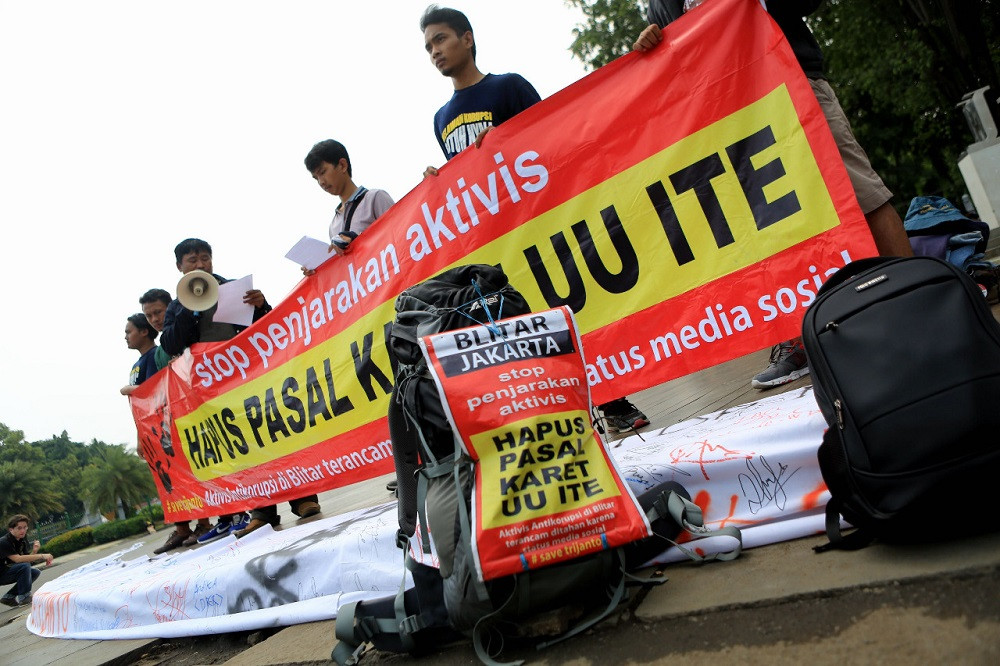Popular Reads
Top Results
Can't find what you're looking for?
View all search resultsPopular Reads
Top Results
Can't find what you're looking for?
View all search resultsCyber troops, digital disruptions and ‘Dildo for Indonesia’
According to the 2017 “Freedom on the Net” report by Freedom House, internet freedom in the region is generally low, made even lower by amendments to cyber laws that enable the state to arbitrarily decide what is critical to national security on a case-by-case basis.
Change text size
Gift Premium Articles
to Anyone
S
ocial media. Love it or hate it, these days, you can’t escape it. Sure, we all know its benefits – staying connected with friends and family, keeping abreast of current affairs and of course, easily comparing product prices and quality when shopping! With it comes the dreaded FOMO (fear of missing out) and worse: cyberbullying, internet trolls, fake news and endless distractions!
And of course, social media is also used in politics. In the United States, Barack Obama was the first presidential candidate to use social media for his 2008 bid, to great effect and success. Donald Trump basically “governs” by tweeting, often spewing outrage, racist rants and attacks that normally would get ordinary people fired.
Recently, the title of a webinar held on Dec. 10 by the ISEAS-Yusof Ishak Institute caught my attention: “Digital Disruption: How Cyber Troops Manipulate Political Opinion in Southeast Asia”.
The webinar’s two panelists were Dr. Yatun Sastrawijaya and Dr. Wijayanto, who were involved in the same project on the rise of cyber troops. Yatun is assistant professor from Amsterdam University, and Wijayanto is the director of the Center for Media and Democracy at the Jakarta-based Institute for Social and Economic Research, Education and Information, better known by its acronym, LP3ES.
Yatun, the first speaker, pointed out that the intensification of what she called “digital disruptions” was a global phenomenon. However, the focus of their research was Southeast Asia and the first of its kind “to assess their impact in different national contexts, zooming in especially on their role in national elections”, she said.
According to the 2017 “Freedom on the Net” report by Freedom House, internet freedom in the region is generally low, made even lower by amendments to cyber laws that enable the state to arbitrarily decide what is critical to national security on a case-by-case basis.
In the Philippines, the internet is deemed “free”, yet at the same time “the Philippines also appears to be the country with the highest density of cyber troop activity in the region, especially since the rise of President Duterte”. His “keyboard warriors” are paid to flood Facebook with pro-Duterte propaganda.
In Vietnam, three out of four internet providers are state- or military-owned, so it’s not surprising that internet in that country is not considered free.
“In 2017, the Vietnamese military acknowledged having a 10,000-strong cyber troop force, named Force 47, who serve as the ‘core-fighters’ in cyberspace to combat antistate propaganda,” said Yatun.
The situations in Thailand and Myanmar are unsurprisingly similar.
“Freedom on the Net” deemed Malaysia, Singapore, Cambodia and Indonesia as partly free, yet still enforced by vague cybercrime laws.
In Indonesia, simple forms of cyber troops and computational propaganda have been used as early as 2012, but Yatun pointed out it reached a turning point in 2016-2017 with the amendment of the Electronic Information and Transactions (ITE) Law, which has been used with increasing frequency.
“At around the same time, sophisticated cyber armies emerged on the online political landscape, such as the Muslim Cyber Army,” she said. They became professionalized during the 2019 elections, when online strategists for both incumbent Joko “Jokowi” Widodo and challenger Prabowo Subianto used paid “buzzers” (influencers) to spread political propaganda and disinformation.
Yatun concluded that cyber troops clearly contributed to the destabilization of political communication and public debate in both the online and offline public spheres, and were therefore a threat to democracy. But she quickly added: “they are as much a symptom of a failing democracy, as much an indication of shrinking civic space as contributing to its decline”.
Thanks for that cheerful insight, Dr. Yatun!
Wijayanto’s presentation focused more specifically on the use of cyber troops and the manipulation of public opinion in relation to specific recent events in Indonesia: the 2019 presidential election, the 2019 revised law on the Corruption Eradication Commission (KPK), the 2020 “New Normal”, the 2020 omnibus bill and the 2020 regional elections amid the COVID-19 pandemic.
Specifically with regard to the KPK and the omnibus bills, he pointed to a sudden emergence of support promoted by cyber troops consisting of bots, anonymous Twitter accounts and real ones affiliated with the government. When analyzed, these accounts had no followers. Nevertheless, media surveys captured these fake accounts as real support for the bills, which resulted in decreased objections to and increased support for the bills.
Pretty depressing, huh? Now that we know this, how do we ordinary citizens fight it?
For now, humor. That is what a group of young people used during the 2019 presidential elections. This was brought to my attention by another paper I read recently, also about the use of social media in politics, “Challenging Hegemony: Nurhadi-Aldo and the 2019 Election in Indonesia” by Timo Duile from the Department of Southeast Asian Studies, Bonn University.
The author recounts the actions of a group of young people, disenchanted and disillusioned by the two presidential candidates, Jokowi and Prabowo, who were more or less touting the same nationalist-Islamist rhetoric. So they produced a fictional presidential pair, Nurhadi and Aldo, with their campaign slogan: “Dildo for Indonesia”. Dildo?? Of course! Just take the last two letters of Nurhadi’s name and the last three of Aldo’s and there you have it: Dildo!
OK, it’s not exactly a solution, but hey, at least we’re laughing!
***
The writer is the author of Julia’s Jihad.










